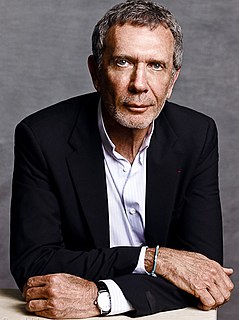A Quote by Joseph Stiglitz
Behind Trump's promise to 'make America great again' lie many fallacies. The most important fallacy is that America's place in the world can be restored to the one it occupied after World War II, when Europe was still recovering from vast devastation and most developing countries were still European colonies. It can't be.
Related Quotes
As you look back in history, we [the United States] have done wonderful things, the Marshal Plan is the most obvious. After World War II, we spent billions of dollars to rebuild Europe or at least part of Europe after the devastation of World War II. We did it out of charity, but we also did it to keep the Russians from getting deeply into Europe.
America felt victorious and generous after World War II. They had also learned from the mistakes after World War I when they imposed punishment on Germany. What became of Germany? A Nazi dictatorship which threatened the world. Today's Germany doesn't feel as prosperous and generous as America then. But actually, Germany still is very prosperous.
It's important to remember that World War II was experienced very much as a continuity in that sense. Most of World War II in most of Europe wasn't a war; it was an occupation. The war was at the beginning and the end, except in Germany and the Soviet Union, and even there really only at the end. So the rest of time it's an occupation, which in some ways was experienced as an extension of the interwar period. World War II was simply an extreme form, in a whole new key, of the disruption of normal life that began in 1914.
It's very important to understand that World War II is at the base of this new policy. From the 1890s on, the U.S. was always imperialistic. We went after the Philippines, and we did the same in Cuba, in Hawaii. We controlled South America. Woodrow Wilson was not what he was supposed to be. He was very much a white man first. "The world must be made safe for democracy." It really accelerates after World War II.
This president and this is what the focus ought to be, it's not the differences between us, it's Barack Obama does not believe America's leadership in the world is a force for good. He does not believe that our strength is a place where security can take place. He leads from behind. He creates an environment that now we're creating the most unstable situation we've had since the World War II era.
The E.U. is the latest of a series of multinational organizations set up after World War II to ensure that there would never again be a pan-European war and to create the conditions for a new European prosperity after the destruction wrought by the war against the Nazis. The E.U. has admirably succeeded at both.
I think in many ways, the Spanish Civil War was the first battle of World War II. After all, where else in the world at this point did you have Americans in uniform who were being bombed by Nazi planes four years before the U.S. entered World War II? Hitler and Mussolini jumped in on the side of Francisco Franco and his Spanish nationalists, sent them vast amounts of military aid, airplanes, tanks - and Mussolini sent 80,000 ground troops as well - because they wanted a sympathetic ally in power. So I think it really was the opening act of World War II.
One of the biggest problems I found with Irish politics and the economic thing was after the war, after World War II, most of the European countries started to develop economically and socially, but whatever way the Catholic church they took a grip and they almost governed the country. I mean, we were almost like a dictatorship. There is good and bad, but we experienced an awful lot of bad, especially from the institutions that taught children the Christian brothers, etc.
If we are going to talk about the most recent of the "Indignados" movements in several countries of the world, including Europe, those are social movements but eventually they will evolve into political movements. This will happen because the traditional bourgeois parties have lost credibility after being the main political influence in most countries of Latin-America and Europe in the last 50 or 60 years.
Industrialized countries have disproportionately more cancers than countries with little or no industry (after adjusting for age and population size). One half of all the world's cancers occur in people living in industrialized countries, even though we are only one-fifth of the world's population. Closely tracking industrialization are breast cancer rates, which are highest in North America and northern Europe, intermediate in southern Europe and Latin America, and lowest in Asia and Africa.





































